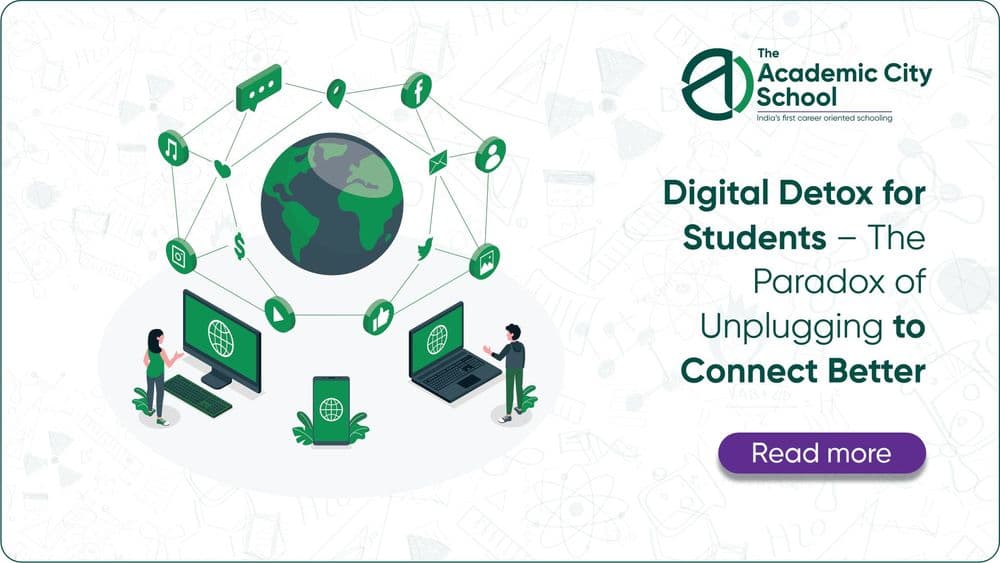
Digital Detox for Students – The Paradox of Unplugging to Connect Better
“Almost everything will work again if you unplug it for a few minutes… including you.” – Anne LamottScreens are everywhere — classrooms, homes, even in leisure time. While technology fuels learning, too much of it can leave students restless and emotionally drained. For parents, the big question is: How do schools balance digital learning with real-life experiences?That’s where hostel schools for boys and girls in Bangalore and CBSE residential schools in Bangalore are leading the way, building in digital detox routines that protect young minds and maintain balance.Why Digital Detox Is EssentialOverstimulation: Constant scrolling or gaming overstimulates the brain, reducing focus.Sleep disruption: Blue light from screens affects melatonin, making it harder for children to rest well.Emotional overload: Social media can heighten anxiety and bring about extreme mood swings.A UNICEF study in 2022 noted that students who limit screen time to under two hours daily report better concentration and emotional health compared to heavy users.How Boarding Schools Make Detox PracticalStructured SchedulesResidential schools in Indore and Bangalore design routines with limited device use. Academic blocks, sports and other activities naturally reduce screen dependence.Tech-Free ZonesLibraries, dining halls and classrooms are often “no-phone spaces.” This gives scope for children to be present in the moment.Outdoor EngagementFrom football fields to debate clubs, children discover joy in face-to-face teamwork, not just online gaming.Guided Digital LiteracyInstead of banning technology, schools teach mindful use — how to research effectively and stay cautious about distractions. This helps in building healthy online practices.Skills Students Gain From Screen BreaksFocus: Improved attention spans for deeper learning.Social skills: Stronger peer bonding through real conversations.Resilience: Learning to manage boredom without resorting to devices.Creativity: Free time sparks drawing, reading, writing or even new hobbies. As discussed in an earlier article, boredom is quite good for children.The American Academy of Pediatrics suggests balanced “media diets,” where device time is matched with offline exploration. Boarding schools are uniquely structured to put this into practice.The Academic City School: Balance at Its CoreAt The Academic City School (TAC), digital detox is a culture of balance. Students learn when and how to use technology and when to step away.Tech-Free Hours built into daily routines.Pastoral care teams guiding emotional wellbeing.Co-Curricular activities that make screen breaks natural.Future readiness programs that blend digital literacy with life skills.Conclusion: Switching Off to Switch OnScreens are here to stay. But discipline and balance make the difference. Schools that embrace digital detox prepare children for life where screens dominate.For parents exploring boarding schools in Karnataka or residential schools in Indore, the right question is not “Does the school use technology?” but “Does the school teach balance?”At The Academic City School, that balance is at the heart of every child’s growth, building focused and emotionally healthy learners.
Read more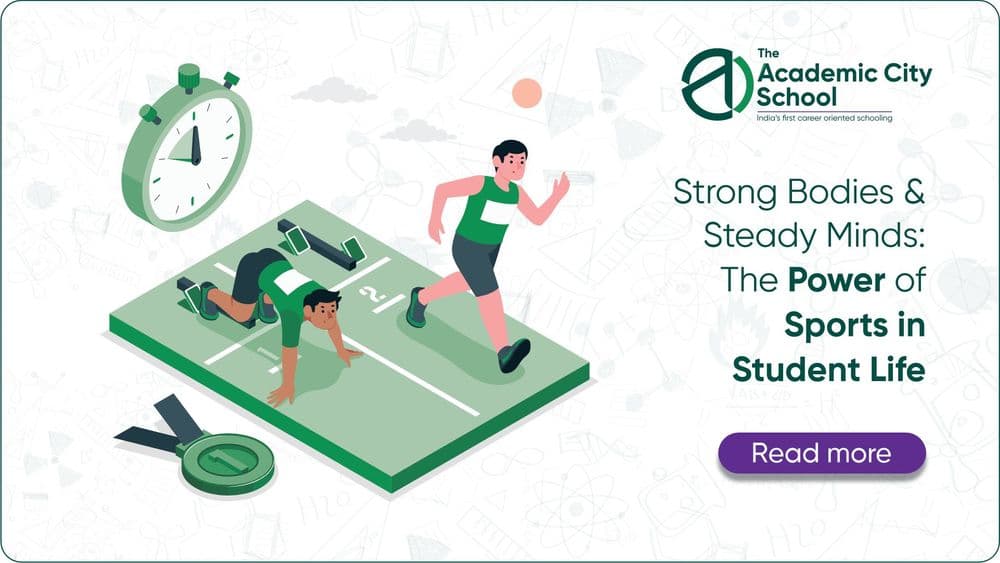
Strong Bodies & Steady Minds: The Power of Sports in Student Life
“A sound mind in a sound body” is an age-old truth that still holds power in today’s high-pressure academic world.Parents often focus on marks and the future possibilities for the child. But ask any educationist and they’ll tell you physical activity is epitome for developing emotional stability. This is why hostel schools for boys and girls in India or co-ed boarding institutions increasingly put structured sports programs at the heart of their education model.Why Sports Matter Beyond the FieldWe know exercise improves health. But for children, it goes deeper:Stress release: Physical activity reduces cortisol levels, helping students manage exam pressure.Boosted mood: Sports stimulate endorphins, which naturally elevate happiness and focus.Better sleep: A structured mix of play and academics improves rest which is vital for learning and growing in general.A 2019 report by the American College of Sports Medicine highlighted that children engaged in regular physical activity perform better academically and report higher emotional well-being.Boarding Schools: Where Sports Are Daily LifeUnlike day schools, boarding schools in Bangalore and across India weave sports into daily routines. Here’s how:Structured timetables: Students have time carved out for games alongside academics.Variety of sports: From cricket and basketball to swimming and athletics, children explore different skills.Guided training: Professional coaches mentor students, helping them channel discipline and passion.Sports are a part of the curriculum which makes the best boarding schools in Bangalore stand apart.Emotional Lessons Sports TeachBeyond fitness, every match or practice session is a classroom for life skills:Resilience: Learning to bounce back from a loss.Teamwork: Understanding how to depend on others and contribute.Leadership: Taking responsibility as captain or role model.Patience: Realising progress takes time and consistency.As Nelson Mandela said: “Sport has the power to change the world. It has the power to inspire and unite people in a way that little else does.” For children, it has the power to build character.Why Boarding Schools in Karnataka Lead the WayKarnataka’s boarding schools, especially in Bangalore, have the advantage of:Spacious campuses that accommodate multiple sports.Green environments that naturally balance body and mind.Access to professional leagues and tournaments, giving students higher exposure.Parents increasingly choose boarding schools in Karnataka because they see that children return home healthier, calmer, more focused and more confident.The Academic City School: Sports as Soul FoodAt The Academic City School (TAC), sports are given equal importance to that of academics. Here’s what sets TAC apart:Dedicated sports hours daily integrated into student timetables.Facilities for a wide range of sports from cricket to athletics and indoor games.Coaches and mentors who teach discipline alongside skills.Balance of academics and fitness to facilitate holistic growth of students.Closing Thought: Balance is the Real SuccessSports are the foundation for emotional strength. On the playground children learn lessons no textbook can teach.For parents exploring good boarding schools in India, it’s worth asking: Does the school see sports as soul food or just a side dish? At The Academic City School, sports fuel both the body and the mind, shaping students to be balanced.
Read more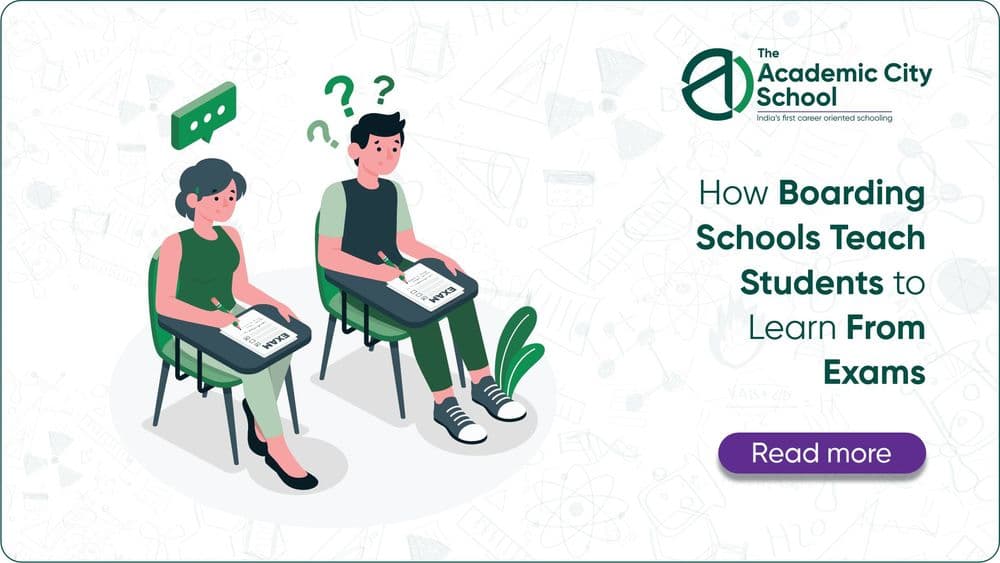
How Boarding Schools Teach Students to Learn From Exams
Introduction: Rethinking ExamsHow many of us remember exams as moments of fear rather than growth? For decades, assessments have been viewed as finish lines — pass or fail, good or bad. But forward-looking educators are reframing the conversation: exams are checkpoints, not endpoints. They show students where they stand, what they’ve mastered and where they can grow next.The real challenge? Helping children see exams this way. And this is where boarding schools in Karnataka and across India play a game-changing role, because of their structure in general.Why Exams Are MisunderstoodPressure from grades: Marks often overshadow the learning journey.Rote vs. real understanding: Traditional exam prep rewards memorisation more than comprehension.Stress culture: Exams are often linked with anxiety, not reflection.As educationist Carol Dweck, author of Mindset, explains:“Tests should be seen as opportunities to measure growth, not as permanent judgments.”Boarding Schools: Turning Exams Into Growth Tools1. Continuous Feedback Over One-Off JudgmentsIn CBSE residential schools in Bangalore, students experience:Weekly reviews to track progress.Mock tests that help normalise the exam atmosphere.Feedback sessions where teachers highlight strengths and gaps.2. Structured Preparation Reduces FearBoarding schools build routines around study and rest. With scheduled time for learning, exams become predictable. Students learn that consistent habits outweigh last-minute cramming.Harvard research on adolescent learning shows structured study environments reduce stress and boost retention.3. Teaching Reflection, Not Just ResultsAfter exams, boarding schools encourage:Self-review: Students analyse mistakes and redo tricky problems.Teacher conferences: Guided discussions help them understand why they went wrong.Peer discussions: Group sharing normalises mistakes and highlights learning strategies.The Growth Skills Exams Can TeachHandled well, exams become tools for life:Resilience: Bouncing back after a tough paper.Adaptability: Learning new strategies for different types of questions.Time Management: Pacing answers within deadlines.Critical Thinking: Applying concepts instead of memorising them.As the OECD’s Future of Education and Skills 2030 report notes:“Assessment should build skills for lifelong learning, resilience, adaptability and curiosity.”Beyond Marks: Connecting Exams to Higher EducationFor parents, one big question is: How do exams prepare my child for college?In boarding schools for higher education planning:Exams simulate real-world challenges like deadlines.Continuous assessments build confidence for competitive exams like JEE, NEET, SAT.Teachers mentor students on linking exam performance to career pathways.Why Karnataka Leads in Exam ReadinessBoarding schools in Karnataka balance academics with wellbeing. Students benefit from:Green, calming campuses that reduce stress.Access to technology-enabled prep tools.Exposure to co-curriculars that keep mental health strong during exam seasons.The Academic City School: Where Exams Become Stepping StonesAt The Academic City School (TAC), assessments are woven into learning. TAC focuses on:Personal Progression Plans: Tailored strategies for every child.Guided Exam Prep: Mock tests and reflective feedback.Balance of Pressure and Support: Stress management workshops and structured study routines.Higher Education Planning: Linking CBSE success to global opportunities.Conclusion: Exams as Growth, Not GloomExams don’t have to be dreaded. In the right environment, they’re mirrors that reflect strengths and weaknesses.For parents considering boarding schools in India, especially CBSE residential schools in Bangalore and Karnataka, the question should be whether schools teach children to face exams with courage and clarity.
Read more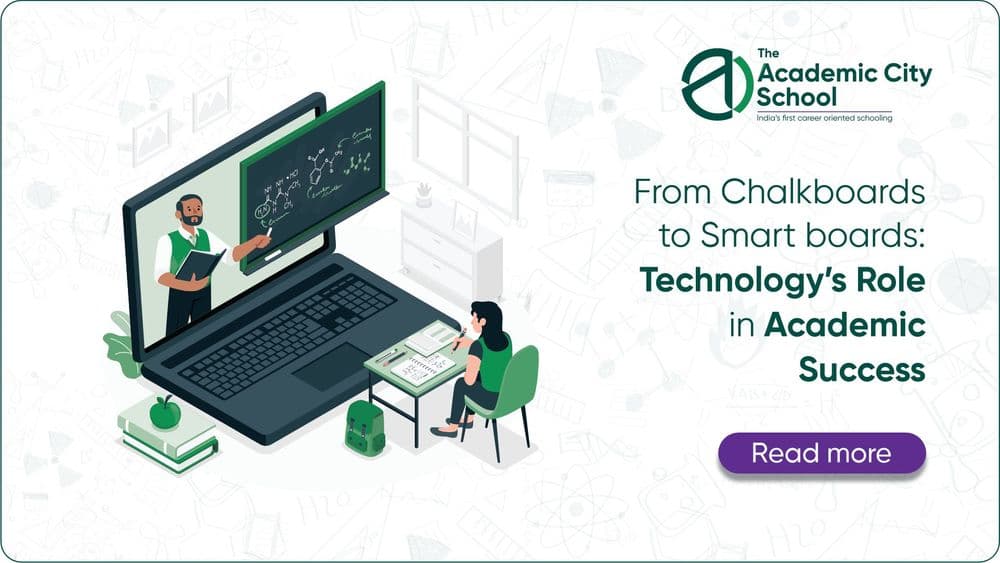
From Chalkboards to Smartboards: Technology’s Role in Academic Success
“The principal goal of education is to create men and women who are capable of doing new things, not simply repeating what other generations have done.” – Jean PiagetIn today’s world, this vision is impossible without technology. From chalkboards that once defined classrooms to interactive smartboards and AI-enabled learning platforms, education has come a long way. Parents now ask: Is technology truly improving learning or is it just a trend?The answer lies in how CBSE boarding schools in Bangalore, future ready boarding schools in India and international residential schools in Bangalore are integrating technology as a driver of academic success.Why Tech in Classrooms MattersTechnology has reshaped how children learn and retain information. A UNESCO report highlighted that digital tools improve both participation and comprehension, especially when used alongside traditional teaching.In schools today:Visual learning: Smartboards allow teachers to bring concepts alive through diagrams and video simulations.Adaptive learning: Students can revise at their own pace with e-learning platforms.Global reach: Virtual exchanges connect students with peers and experts worldwide.The Boarding School AdvantageWhile most schools adopt technology, boarding schools have the unique advantage of extending its use beyond classrooms.Round-the-clock access: With well-equipped labs and libraries, learning doesn’t stop at the bell.Structured digital habits: Students learn to balance screen time with real-world collaboration.Mentorship and monitoring: Teachers guide students on using technology responsibly and effectively.Tools That Make a DifferenceTechnology in boarding schools is more about outcomes. Some impactful tools include:Flipped Classrooms: Students watch lessons online before class, using time with teachers for problem-solving.STEM Labs: Robotics and coding labs help translate theory into practice.AI-based Assessments: Platforms that track student progress and suggest personalised learning paths.Skills for a Digital FutureEmployers worldwide stress that tomorrow’s workforce needs digital literacy, critical thinking and adaptability along with subject matter expertise.Global studies, including those by the OECD, show that students exposed to technology-supported learning are:More confident problem-solvers.Better at collaborating across platforms.More adaptable to future workplace technologies.Why Bangalore Leads in Tech-Driven SchoolsIt’s no surprise that CBSE boarding schools in Bangalore stand out. Being in India’s tech hub means students are exposed to innovation firsthand:Visits to startups and global tech companies.Guest lectures from industry leaders.Internships and workshops that connect school to the real world.The Academic City School: Where Tradition Meets TechnologyAt The Academic City School (TAC), technology is woven into the learning journey. Recognised among future ready boarding schools in India, TAC offers:Smart classrooms powered by interactive tools.A dedicated STEM and innovation lab.Digital platforms that track individual progress.Career guidance programs linked with global tech industries.Conclusion: The Future is Digital—and HumanTechnology is shaping education, but its power lies in how schools use it to enhance teaching. The smartest schools balance screens with human connection, ensuring children learn responsibility alongside digital skills.The Academic City School stands as a shining example, where chalkboards and smartboards co-exist, shaping students into globally ready learners.
Read more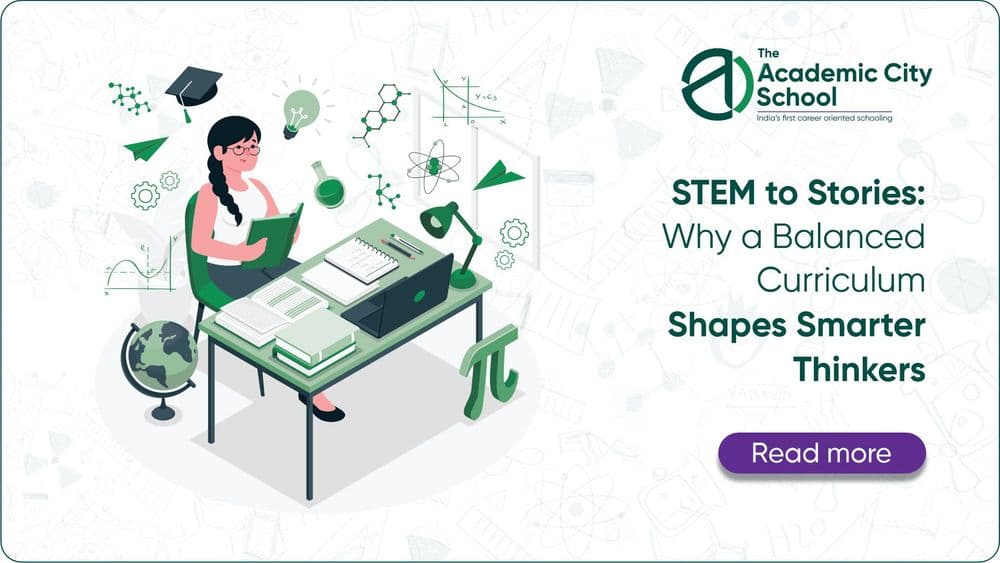
STEM to Stories: Why a Balanced Curriculum Shapes Smarter Thinkers
Introduction: More Than Just Marks“What use is a mind if it can’t connect science with society or logic with imagination?” This question lies at the heart of education today. Parents everywhere want their children to excel in math and science, but also to think critically.In CBSE residential schools in India, the shift is clear — academics no longer live in silos. The best boarding schools in India are blending STEM with humanities, sports and the arts to shape students into smarter, adaptable thinkers.The Academic City School in Bangalore has pioneered this balance, making it one of the good boarding schools in Bangalore that truly embodies holistic growth.Why Balance Matters: The Big PictureFor decades, education tilted heavily towards STEM — Science, Technology, Engineering and Mathematics. These subjects drive innovation and are crucial for careers. But as the World Economic Forum has repeatedly highlighted, the most valuable skills for the future also include creativity, communication and empathy.Balanced curricula encourage children to not just solve equations, but to tell the story behind the numbers. To not just code, but to collaborate.How Boarding Schools Create This BalanceA. Structured but Diverse DaysUnlike day schools, boarding schools in India have the time to integrate academics with co-curriculars. A student’s day might flow from physics class to basketball practice, then from evening study hall to a debate session.As Sir Ken Robinson noted, “Creativity is as important as literacy.” Boarding schools embrace this principle by giving children exposure to both.B. STEM Gets HumanisedCBSE residential schools in India encourage students to explore the human side of STEM:Designing science models that solve community problems.Writing reflective essays on environmental issues.Combining coding with storytelling in digital media clubs.C. Arts and Sports Build Skills for STEMIt may surprise parents, but music improves math comprehension and sports teach focus and resilience — qualities essential for scientists and engineers. A balanced curriculum connects these dots.A 2019 UNESCO report emphasised that integrating arts and culture into education fosters innovation. Good boarding schools in Bangalore are taking this seriously by giving equal weight to stage performances, art labs and design clubs.The Real Outcomes of BalanceSmarter Decision-Making: Students learn to see problems from multiple angles.Better Communication: Future engineers can explain complex ideas clearly.Adaptability: Switching between subjects trains the brain to adapt quickly.Confidence: Performing on stage or winning a debate builds the same confidence needed to present research or pitch ideas.As Nobel Laureate Rabindranath Tagore once said, “The highest education is that which does not merely give us information but makes our life in harmony with all existence.” Boarding schools live out this philosophy daily.The Academic City School (TAC)At The Academic City School in Bangalore, balance is part of the DNA. Here’s what sets TAC apart:CBSE Excellence: Rigorous academics with individual progression plans.STEM Meets Arts: Robotics clubs run alongside theatre groups and music bands.Sports for Focus: Dedicated fields and coaches keep fitness at par with academics.Leadership & Expression: Debates, Model UNs and cultural events sharpen confidence.Conclusion: Raising Smarter ThinkersIn today’s world, knowledge without creativity falls short and creativity without discipline loses direction. Balanced education is an absolute necessity.Boarding schools in India, especially good boarding schools in Bangalore like The Academic City School, provide this balance every day. By blending STEM with stories, logic with imagination and academics with life skills, they’re preparing children for futures where they thrive.
Read more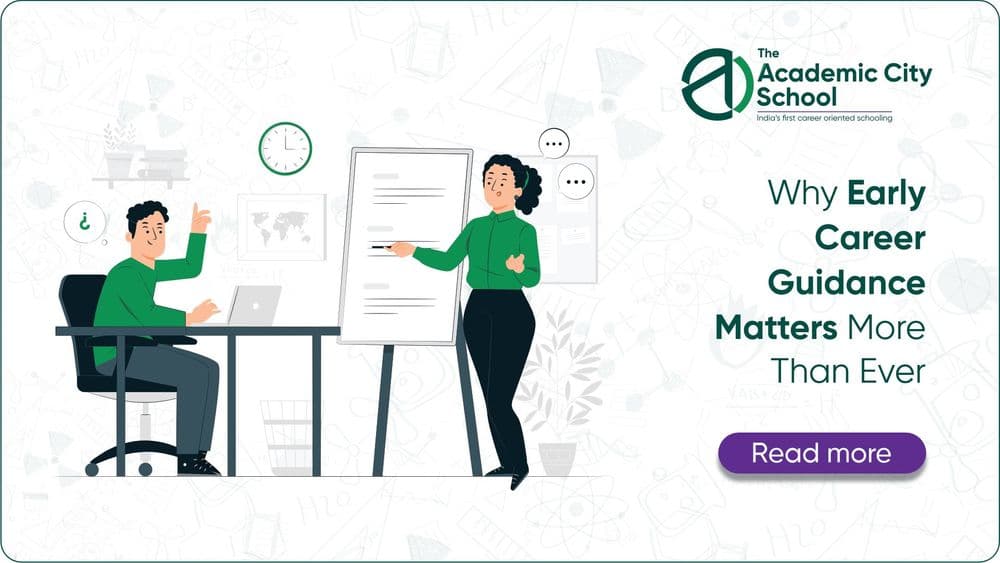
Why Early Career Guidance Matters More Than Ever
“Children must be taught how to think, not what to think.” – Margaret MeadParents often wonder: Will my child’s education really prepare them for life? In today’s fast-changing world, this is no small question. Careers no longer follow predictable paths. The fast changing world is reshaping opportunities every day. That’s why early career guidance has become essential. It is not something to postpone until college.And this is where boarding schools for career counseling in India are making a real difference.Why Career Guidance Cannot Wait Until CollegeA generation ago, career decisions often started after Class 12. But today, waiting that long can leave students confused or unprepared.According to the OECD’s “Dream Jobs?” study, teenagers who engage in workplace-linked activities such as internships are significantly more likely to land jobs aligned with their interests in adulthood. Early exposure builds clarity and resilience, while delayed guidance often leads to rushed, less-informed choices.What Career Guidance Looks Like in SchoolsIn international boarding schools for career guidance, future-readiness is a practice.Aptitude & Strength Mapping: Regular assessments highlight student strengths and help align them with career paths.Personalised Roadmaps: Mentors craft progression plans that evolve with each child’s interests.Parent Involvement: Families join counseling sessions so decisions are collaborative.Industry Interaction: Guest lectures, project-based learning and career fairs bridge academics with real-world opportunities.Why Boarding Schools Are Uniquely SuitedDay schools often struggle to dedicate consistent time to career planning. Boarding schools, with their structured environment, can integrate guidance seamlessly:Dedicated career cells that track student progress over years.After-hours sessions without the pressure of commutes.Peer mentoring, where seniors share insights with juniors.Clubs and co-curriculars designed around career exposure.Career exploration isn’t a destination. It’s a journey. Boarding schools, with their time and structured environment, make that journey meaningful and fruitful.Why Bangalore Offers a Unique EdgeWhen parents think of career focused hostel schools in Bangalore, the location itself is a major advantage.Students gain access to tech hubs and start-up ecosystems.Workshops, innovation labs, and corporate visits show careers in action.Networking opportunities with entrepreneurs and professionals broaden horizons.A balance of global exposure with Indian cultural grounding makes for a holistic learning environment.Skills That Last a LifetimeCareer counseling shapes transferable skills that stay with children for life:Adaptability: Handling new environments with ease.Critical Thinking: Evaluating choices and perspectives before deciding.Communication: Expressing ideas confidently in diverse settings.Confidence: Believing in their ability to chase unconventional opportunities.A World Economic Forum report confirms that employers rank these life skills as highly as academic qualifications. Boarding schools provide the stage where these skills are developed daily.The Academic City School: Turning Guidance Into GrowthAt The Academic City School (TAC), career counseling is not left to chance. Recognised among top international boarding schools for career guidance, TAC ensures that students are equipped for life beyond exams.Here’s how TAC makes a difference:Structured Counseling Tracks: Begin as early as middle school.University & Industry Partnerships: Students interact with mentors across the globe.Balanced Ecosystem: Strong CBSE academics + leadership, arts, STEM and sports.Future-Ready Planning: Guidance for both Indian and international universities.Parents often describe TAC as a place where discipline meets creativity and where their children return home inspired.Conclusion: Guidance Today, Opportunities TomorrowPostponing career conversations risks leaving students anxious or underprepared. Starting early, on the other hand, builds resilience, clarity and courage to dream bigger.As Nelson Mandela said, “Education is the most powerful weapon which you can use to change the world.” Today, part of that education is career guidance that equips children for industries and roles we cannot yet imagine.
Read more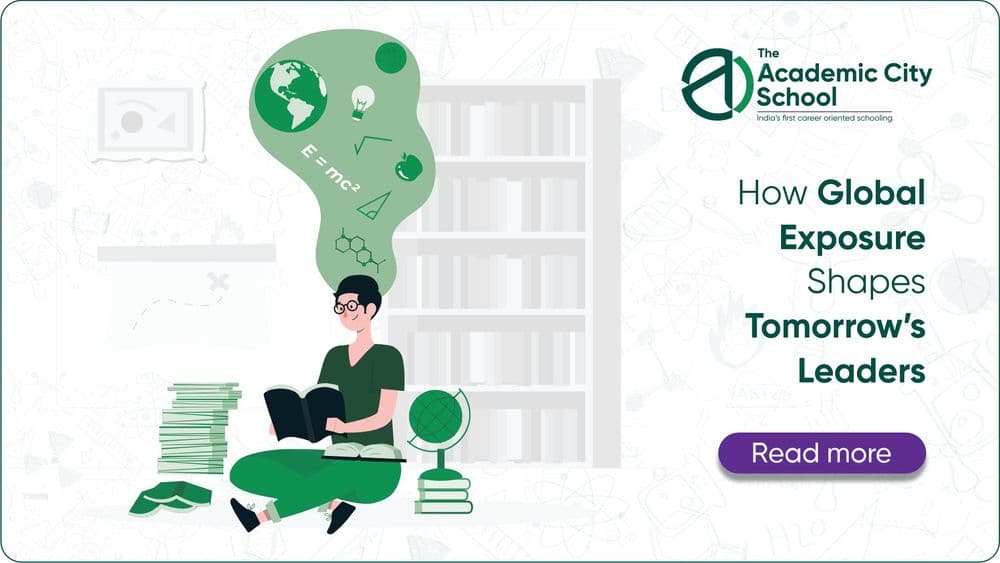
How Global Exposure Shapes Tomorrow’s Leaders
“Education is the most powerful weapon which you can use to change the world.” – Nelson MandelaIn today’s interconnected world, those words carry more weight than ever. Education isn’t only about marks or mastering a subject—it’s about preparing children for a global stage where opportunities cross borders and careers demand adaptability. Parents increasingly ask: “How do I make sure my child is future-ready?”The answer lies in schools that embed global exposure into everyday learning. That’s why international boarding schools for career guidance and future-ready boarding schools in India are becoming the first choice for families who want more than conventional academics.Why Global Exposure Matters TodayGlobal careers no longer follow straight lines. A student may study medicine in India, specialise in public health in Europe, and later work for an NGO in Africa. Opportunities shift rapidly, and children exposed to diverse perspectives early are better prepared to thrive.The OECD’s Future of Education and Skills 2030 framework notes that “global competence” is as vital as literacy or numeracy. It means being able to connect and collaborate across cultures—skills best developed in diverse school environments. Global exposure equips children with the tools to adapt and innovate in uncertain futures.What Global Exposure Looks Like in SchoolsIt goes far beyond exchange trips or language electives. In future-ready boarding schools in India, global exposure is built into daily life:Classrooms of Diversity: Students interact with peers from across states and countries, making global history and culture part of everyday learning.Mentorship from Across Borders: Guest lectures and collaborations connect learners with experts worldwide, giving them insights into modern careers.Exchange & Collaboration: International partnerships enable joint projects, cultural exchanges, and even virtual internships, preparing students to work in global teams.Skills That Come With Global ExposureParents often ask if global exposure translates into skills. The answer is yes. It builds qualities employers rank alongside academics:Adaptability: Learning to adjust to new environments and ideas.Critical Thinking: Exposure to diverse viewpoints sharpens analysis and decision-making.Communication: Students learn to express ideas clearly across cultures and contexts.Confidence: Presenting at international workshops or competing globally develops self-belief.The UNESCO Global Education Monitoring Report highlights that schools offering international programs help students nurture empathy and collaboration—skills vital in today’s workplaces.The Career ConnectionGlobal exposure is closely tied to career readiness. In boarding schools focused on higher education planning, career conversations begin early—not in Grade 12. Students benefit from:Aptitude Tests & Assessments: Aligning strengths with opportunities.Parental Involvement: Guidance sessions keep parents part of the decision-making process.Higher Education Insights: Preparing for both Indian and international systems with exam prep, portfolios, and interviews.Why Bangalore Leads the WayWhen it comes to boarding schools in India, location matters. Bangalore—often called the Silicon Valley of India—offers unmatched opportunities. Career-focused hostel schools here connect students directly to tech hubs, research institutions, and multinational corporations.Industry visits, innovation workshops, and talks by entrepreneurs show careers in action. This unique mix of global industry access and cultural grounding makes Bangalore and Karnataka top destinations for international-standard boarding schools.A Parent’s LensParents who once hesitated about boarding schools now speak of transformations. Children return home more articulate, ambitious, and clear about their goals. As Sir Ken Robinson said, “Education is not about filling a bucket, but lighting a fire.” Global exposure lights that fire early—opening possibilities many students may never have considered.The Academic City School: Global Readiness in ActionAt The Academic City School (TAC), global exposure is not an event but a culture. Recognised as one of India’s future-ready boarding schools, TAC integrates international opportunities into a strong CBSE foundation:Career Counseling Tracks: Step-by-step plans for academic and career readiness.International Mentorship: Access to global experts, projects, and collaborations.Holistic Growth: STEM, arts, sports, and leadership built into school life.Higher Education Planning: Guidance for both Indian and international university pathways.Conclusion: Education Without BordersGlobal exposure bridges learning with opportunity. It shapes academic strength and resilience, but also adaptability and vision. International boarding schools for career guidance and higher education planning prepare children for a world where success depends on confidence as much as competence.At The Academic City School, this vision comes alive daily. Students graduate with a mindset ready for tomorrow’s challenges and opportunities—education without borders.
Read more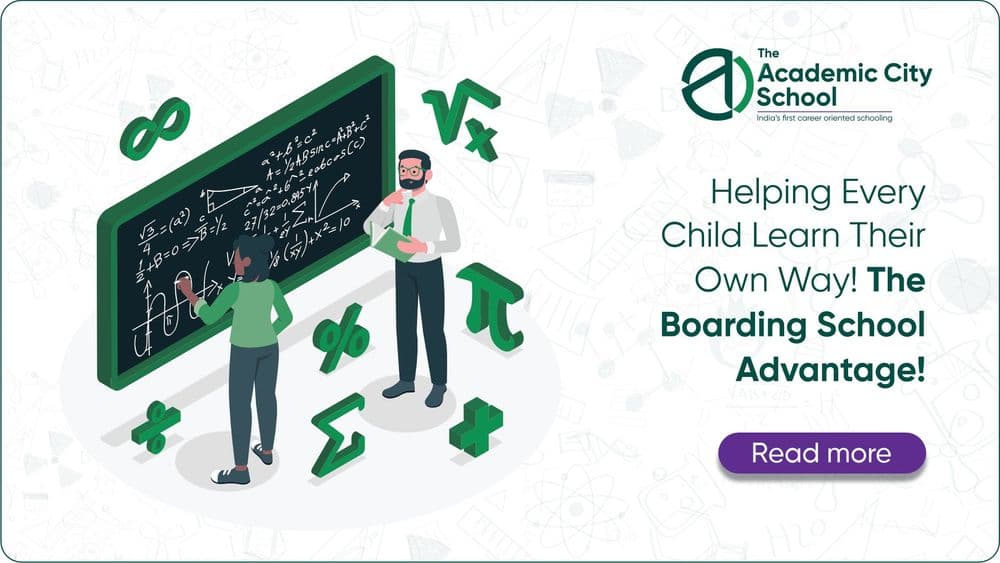
Helping Every Child Learn Their Own Way! The Boarding School Advantage!
What works for one child may not work for another. Every parent knows this instinctively. Yet, in traditional classrooms, students are often expected to learn in the same way, at the same pace, with the same methods. That’s where personalised learning steps in—and why good boarding schools in India are taking it seriously.At CBSE residential schools in India, the focus is shifting from “one-size-fits-all” academics to approaches where every child’s unique strengths and pace are taken into account.Why Personalised Learning MattersChildren thrive when teaching adapts to them, instead of forcing them to adapt to rigid teaching styles. Research and practice in personalised learning show improvements not only in test performance but also in problem-solving and critical-thinking—exactly the kind of growth many parents want for their children.How Boarding Schools in India Put Personalisation into PracticeUnlike day schools—where time with students is limited—boarding schools offer the advantage of continuous learning environments. Teachers don’t just see children in class; they observe study habits, extracurricular strengths, behaviour, and how students respond to setbacks. Personalisation shows up in many practical ways:Individual Progression Plans: Customised learning roadmaps help every learner move forward. A student struggling in science might get extra lab time, while another excelling in literature could be guided into debates and writing clubs.Mentorship Beyond Classrooms: Thoughtful conversations during dorm study hours or at lunch often reveal what truly excites a student, helping educators guide academic choices and goal-setting.Flexible Learning Methods: Visual, hands-on, discussion-oriented—CBSE residential schools increasingly weave in project-based learning, flipped classrooms, self-directed modules, gamified tasks, and tech-enabled experiences to match learning styles.Real-Life Impact: Stories of ChangeIn personalised environments, children often discover strengths they didn’t know they had. Active participation in clubs, labs, arts, and sports builds communication and confidence over time. When challenges are identified early and addressed through mentorship, students not only overcome weaknesses but also develop resilience—and the ability to thrive in new areas.Boarding Schools and the Academic EdgePersonalised learning isn’t only about academics—but it does make academics smarter and healthier:Structured Exam Prep: Instead of last-minute cramming, students follow customised study schedules with timely feedback and revision loops.Career Guidance: Many boarding schools combine aptitude profiling with personalised mentoring so students discover interests early and plan pathways with clarity.Resilience & Balance: Because learners progress at their own pace, they’re less likely to burn out under pressure—and more likely to sustain curiosity.Why Location MattersSchools in Bengaluru, for example, benefit from proximity to tech hubs, universities, multinational companies, and start-ups. Career-focused hostel schools can connect students with real-world exposure—guest lectures, internships, innovation workshops, and visits to research labs—so classroom concepts meet practical applications.The Academic City School: Personalisation in ActionAt The Academic City School (TAC), personalised learning is a day-to-day practice designed to help each learner find and follow their path:Individual Progression Plans (IPPs): Every student has a clear roadmap with goals, supports, and periodic reviews.Mentorship Model: Teachers and mentors guide both academic progress and emotional wellbeing.Balanced Approach: Equal focus on curricular, co-curricular, and life skills—so strengths are nurtured alongside fundamentals.Global Readiness: Opportunities to connect with international mentors and collaborative projects expand horizons and confidence.Parents often describe TAC as a place where children “find themselves.”Closing Thought: Every Child, Their Own PathEducation should help children understand their strengths—and use them well. Personalised learning at good boarding schools in India is making this possible every day. At The Academic City School, children follow a path designed for them. Because the future isn’t one-size-fits-all. And neither should education be.
Read more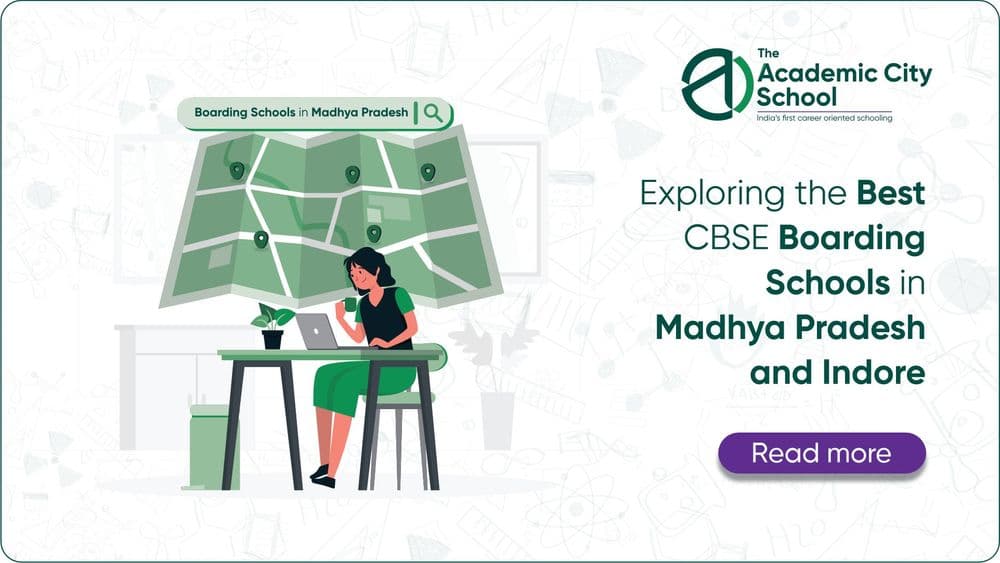
Exploring the Best CBSE Boarding Schools in Madhya Pradesh
A Parent’s Guide to Choosing the Right Path for Your Child“What if your child’s classroom stretched beyond walls, books and bells?” That’s the promise of residential schools. In Madhya Pradesh and Indore, the demand for CBSE boarding schools has been steadily rising—and for good reason. Parents today want more than grades; they want life skills and a supportive environment where children grow into well-rounded, confident individuals.Why Parents Are Turning to CBSE Boarding Schools in Madhya PradeshCBSE has long been a strong backbone for Indian education, with clear pathways for national exams and widely recognised standards. Paired with the residential model, its impact multiplies:Academic continuity: Students benefit from structured study hours and teacher guidance beyond the classroom.Consistency: A residential routine blends study, sports, activities, and reflection into the day-to-day rhythm.Focus: Without long commutes or frequent distractions, children can devote quality time to academics and skill-building.A 2022 review related to the National Education Policy observed that structured residential settings naturally encourage peer learning and time management—two abilities families in Madhya Pradesh value deeply.Beyond Academics: Building the Whole ChildOne of the biggest strengths of residential schools in Indore and across Madhya Pradesh is the emphasis on personality development and real-world skills:Leadership & teamwork: From school councils to house events and sports captains, children get early, repeated chances to lead and collaborate.Resilience & independence: Living away from home helps students manage routines, care for belongings, and adapt confidently.Creativity & curiosity: Arts, robotics, debating, and theatre nurture passions alongside academics.Residential Life: Friendships and Cultural ExposureIndore’s schools reflect the city’s cultural richness and diversity. Students live and learn with peers from across India, which helps them develop a broader worldview:Lifelong friendships: Shared routines and experiences forge strong bonds.Cultural fluency: Children learn to appreciate diverse traditions and perspectives.Social intelligence: Daily community living builds communication skills and empathy.What to Look for in a CBSE Boarding SchoolIf you’re evaluating CBSE residential schools in India—especially in Madhya Pradesh and Indore—use this practical checklist:Campus & infrastructure: Safe, green campuses; modern labs, libraries, playgrounds; well-equipped hostels.Academic excellence: Experienced faculty, strong board results, and supportive academic processes.Pastoral care: Mentors and counselors who support both emotional wellbeing and academics.Extracurricular depth: Balanced programs in arts, sports, clubs, and leadership.Career readiness: Guidance for competitive exams and future-ready skills (communication, problem-solving, digital literacy).Spotlight on Indore: Why Families Choose ItIndore has emerged as a central India education hub. Families appreciate its balance of opportunity and safety:Access to enrichment: Cultural, industrial, and academic resources within reach.Holistic ecosystem: A growing set of residential schools committed to whole-child development.Right-sized city: A location that blends tradition with progress and supportive community values.The Academic City School (TAC): A Model for Holistic EducationAmong CBSE boarding options in Madhya Pradesh, The Academic City School (TAC) stands out for its student-centred approach:Academic strength: Rigorous CBSE curriculum supported by Individual Progression Plans and continuous feedback.Holistic growth: Sports, arts, STEM clubs, and leadership programs are built into the week—not just add-ons.Pastoral care: A warm, safe environment where every child is known, guided, and encouraged.Global readiness: Opportunities to engage with mentors, projects, and collaborations that broaden horizons.Parents often describe TAC as a “second home” where discipline meets creativity—helping children grow with confidence and purpose.Closing Thought: Education That Lasts a LifetimeChoosing the right CBSE residential school in Indore or Madhya Pradesh shapes more than report cards—it shapes character. Academic excellence matters, but so do resilience, leadership, empathy, and a love for learning. The Academic City School exemplifies this philosophy, preparing children not just for exams, but for life.
Read more
The Secret to Academic Success? Strategies Students Actually Use
Unlocking Smarter Learning. How Boarding Schools Equip Students to Excel!Learning Beyond the DeskWhat if every hour your child studied, counted double? That’s the promise of strategy-led learning. Success today is a lot about learning how to learn. Sounds confusing? Let’s decode it…Boarding schools in India are uniquely placed to teach students how to learn, because all of us understand and agree that rote method (what we saw growing up) may help children memorise facts, but it doesn’t build understanding and that leaves them struggling to apply knowledge in real-life situations.With structured routines and mentorship, the environment is built for focus which turns studying into a skill that lasts for life.Why Boarding Schools Have the Edge!Turning Time into an AllyIn good boarding schools in Bangalore, a child’s day is designed with balance—study hours, meals, sports, and downtime. This rhythm helps students stay on track without the chaos of procrastination.Harvard’s Center on the Developing Child notes that consistent routines build planning and focus skills, both of which are vital for academic success.Personal Attention That MattersIn CBSE residential schools, small class sizes mean no child is overlooked. Teachers become mentors. They notice when a child struggles, they encourage the children’s strengths and they help build confidence step by step.The Power of PeersStudying in groups is common in boarding schools. They learn best when they discuss in groups and help each other understand concepts. Such learning stays for life. A Stanford study even showed that peer-to-peer teaching improves retention significantly. Parents often say their children return home explaining concepts more clearly than ever—a solid proof of learning that sticks.Study Strategies That WorkActive Learning, Not RoteChildren are encouraged to create mind maps and practise with quizzes to test their knowledge in real-world contexts. It’s about connecting ideas.Progress in Small StepsSuccess doesn’t come in leaps. Boarding schools teach children to set smaller milestones and celebrate each one. Weekly progress reviews give clarity and reduce last-minute exam panic.Exam Preparation with CalmMock exams and timed practice papers before tests help children walk into exams with confidence.Looking Ahead: From School to CollegeRoadmaps for Higher EducationBoarding schools for higher education planning start early. Counselors help children choose subjects wisely and prepare for entrance exams.Building Transferable SkillsAcademic strength is paired with life skills such as research, presentation, communication and problem-solving. These are the qualities that prepare students for careers.Why Setting MattersLocation and environment shape how children study. Boarding schools in Karnataka often combine calm, green surroundings with modern facilities. In Bangalore, career-focused hostel schools also connect students with tech hubs and industry visits. The result? A child who learns with focus and looks ahead with ambition.The Academic City School: Where Study Habits Become Life HabitsAt The Academic City School, study strategies are practised as a part of everyday life.Individual progression plans tailored to each childStructured study routines that encourage discipline without stressMentorship that balances academics with emotional careGuidance for CBSE success alongside higher education planningTAC ensures children learn how to work smarter. Parents often remark how their children become confident individuals.Smarter Learning, Brighter FuturesThe difference between average results and lasting success often lies in strategy. Boarding schools in India are helping children master the art of studying.At The Academic City School, these strategies come alive daily, helping students prepare for life’s bigger tests.Quick Exam Prep Toolkit For Students10 Smart Exam Preparation StrategiesPlan Backwards from Exam Dates – Break subjects into smaller chunks and map them week by week instead of cramming at the last minute.Set Daily Study Goals – Focus on mastering one concept or chapter at a time. Specific goals make progress measurable.Use Active Recall Over Rote – Test yourself with flashcards, practice questions or by teaching a peer. This boosts retention more than passive reading.Spaced Repetition for Memory – Revisit key topics at regular intervals (e.g., after 1 day, 3 days, 1 week) to cement them in long-term memory.Practice Past Papers – Solve previous years’ papers or mock tests under timed conditions to build exam stamina and familiarity with formats.Create Visual Maps – Diagrams and flowcharts help simplify complex topics and strengthen connections.Mix Subjects in a Day – Studying two or three different subjects daily keeps the brain alert and prevents fatigue.Stay Physically Active – Short walks, stretching, quick exercises or even meditation improve focus and reduce stress during long study hours.Sleep & Nutrition as Study Tools – Adequate rest and balanced meals enhance concentration and memory consolidation.Reflect at the End of Each Day – Spend 10 minutes reviewing what worked, what didn’t and what to adjust in the next day’s plan.
Read more
Holistic Growth in Focus: The Boarding School Advantage in Bangalore and Karnataka
Where Education Meets Character and ConfidenceEvery parent asks the same quiet question: Am I preparing my child for exams or for life?In today’s world, the answer cannot stop with grades alone. Children need confidence and adaptability to thrive. That’s why many families are turning to boarding schools in Bangalore and Karnataka—places where classrooms stretch into life.At The Academic City School, we meet parents every week who say, “We don’t just want results, we want resilience.” This is where holistic growth truly begins.Why Bangalore and Karnataka?Few regions in India bring together tradition and innovation quite like Karnataka. Bangalore, with its tech hubs and cosmopolitan culture, gives students early exposure to global thinking. The wider state adds heritage and a legacy of quality education.For parents, that means the best of both worlds—children who grow up rooted in values, yet ready to face tomorrow’s challenges.Life Inside a Boarding SchoolBoarding life feels different. Children do everything together, absorbing lessons from books and from each other.Routines build discipline.Chores build independence.Friendships build emotional strength.One former student of a leading Karnataka boarding school said, “I came back for holidays and my parents were shocked that I was waking up on time without being told.” Small changes like these add up to lifelong habits.What Holistic Growth Looks LikeStrong academics are only the start. The best schools weave in curriculars and co-curriculars with emotional care as part of daily life. On the cricket field, children learn teamwork. In the music room, they discover expression. In counseling sessions, they find space to process feelings. And in dormitories, they learn to respect differences and live with empathy.Educationist Sir Ken Robinson once said, “Education is not just about learning facts, but about unlocking creativity.” Boarding schools that embrace this idea help children grow into complete individuals.What Makes the Best Schools Stand OutWhen parents search for the best boarding schools in Bangalore or Karnataka, they often look beyond facilities. They look for safety and balance.Modern labs and libraries matter. At the same time, mentors who know every child by name matter too. International exposure matters. At the same time, the culture of discipline and independence matters too. It’s this balance that makes boarding education holistic.The Academic City School DifferenceAt TAC, we believe education must prepare children for both careers and character. That’s why:Our CBSE foundation is matched with personalised learning plans.Every student engages in sports, arts, leadership and STEM programs.Pastoral care ensures emotional wellbeing is never left behind.International exposure comes built into the curriculum.A TAC parent recently said, “When my daughter joined, she was shy. Today she speaks on stage with confidence. That is more valuable to me than any mark sheet.”The TakeawayHolistic growth is the future. The boarding schools in Karnataka that succeed are the ones preparing children to face life with courage and competence.At The Academic City School, we carry this promise forward. Our students prepare for life.
Read more
How International Boarding Schools Shape Future Career Paths
From classrooms to careers, how the right environment builds tomorrow’s leaders!The Big Question Parents AskEvery parent wonders: “Will my child’s education truly prepare them for life ahead?”In today’s world, careers don’t follow a straight line anymore. A child may dream of medicine today, switch to design tomorrow, and later discover opportunities in global industries we can’t even imagine right now. That’s why international boarding schools for career guidance are stepping in to shape futures with real-world skills.At The Academic City School, this is a daily reality. Here, classrooms are about preparing children for the careers and challenges of the future.Why Career Guidance Matters EarlyResearch by the OECD shows that teenagers who engage in workplace-linked activities like internships or career talks are more likely to thrive in adulthood. Early exposure to career pathways reduces confusion and boosts confidence later on.When students explore careers in their school years, they:Connect interests with opportunities.Build resilience against future uncertainty.Make informed subject and college choices.What International Boarding Schools Do DifferentlyUnlike traditional setups, international boarding schools for career guidance build career readiness into everyday learning.Personalised roadmaps: Students undergo strength assessments, interest mapping, and one-on-one counseling. Parents are often part of these conversations, ensuring that guidance feels personal and aligned.Global mentorship: Through guest lectures and collaborative exchange programs, students connect with global experts and industries that help broaden their horizon far beyond local boundaries.Inside Boarding Schools in India: Career Conversations That CountCloser to home, many boarding schools for career counseling in India are building structured guidance systems. Dedicated career cells track student progress and help create growth charts that map potential pathways.For instance, in career-focused hostel schools in Bangalore, students get access to tech hubs, entrepreneurs, industry events, cross-cultural exchanges, and hands-on career workshops with global industry leaders. This combination of structured academics and ecosystem exposure is what sets them apart.Why Bangalore’s Ecosystem Gives an EdgeParents often ask, “Does location really matter?” The answer is yes.In Bangalore, students live in the heart of India’s tech and innovation capital. Career-focused hostel schools in Bangalore often organise industry visits and internships. Students see careers in action.Skills That Last a LifetimeFuture careers demand more than subject knowledge. They require adaptability and emotional intelligence. International boarding schools nurture these through:Model UN debates that build public speaking.Coding labs that enhance problem-solving.Entrepreneurship clubs that inspire risk-taking.Internships that bridge theory with practice.As the OECD puts it, “Early and meaningful career experiences shape long-term employment outcomes.”The Academic City School: Where Futures Take FlightAt TAC, students prepare with:Structured career counseling tracks from middle school.Partnerships with universities and industries.Individual progression plans for every student.A balanced ecosystem of CBSE academics and global exposure.Recognised among career-focused hostel schools in Bangalore, The Academic City School ensures that each child graduates future-ready.Closing Thought: Planting Seeds for TomorrowEducation is not only about marks. It’s about the courage to dream and the skills to turn vision into reality.International boarding schools for career guidance offer this bridge—from classrooms to careers, from today’s lessons to tomorrow’s leadership.At The Academic City School, we take this responsibility seriously. Everything is designed to help children step into the future with clarity and confidence.
Read more